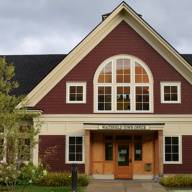Three separate votes – that’s what it took this year to pass the budget for the Harwood Unified Union School District.
Hoping to avoid a repeat next year, local school officials held an educational forum last week with a panel discussion among state lawmakers, school administrators and an education funding expert. About 50 people attended the November 19 event at Harwood Union High School.
Their goal was to explain how Vermont school funding works, and why property taxes locally went up by almost 16% in Waterbury, and as high as 21% in Warren. Duxbury had the lowest increase of 12% this year. Harwood’s 2024-25 approved school budget of $47,892,873 reflects an increase of 5.4% from the previous year.
One audience member at the forum expressed the frustration many taxpayers feel. “I just came off a 14-hour workday to come to this meeting, and I’m sick of all this ridiculous spending,” said Moretown resident Travis Blodgett. “I don’t live here – I survive here.”
State Senator Andrew Perchlik, P/D-Washington, recognized that most audience members were hoping for fast solutions to fix difficult tax increases. But he said that’s unlikely.
“How we do that in one year, I'll be honest with you, I don’t have the answer,” Perchlik said. “To really have the impact that we want to see so that we don't have property tax increases here in The Valley, that's going to take a longer time.”
He promised to work with Governor Phil Scott and his administration starting day one of the upcoming legislative session.
State Senator Martine Gulick, D-Chittenden Central, attributed Vermont school budget increases to a decline in enrollment. That means teachers and staff are not working to full capacity. She also blamed the state’s rural geography, which makes providing education more expensive.
Still, Gulick has a positive outlook going into this budget season. “It’s going to be a change, and it’s going to be challenging, but I’m hopeful,” the Burlington senator said. “I’m an optimistic person that this project and this work that we are doing is going to bear fruit.”
Another panelist at the forum was Tammy Kolbe, PhD, a principle researcher at the American Institutes for Research and Associate Research Professor at the University of Vermont.
“Money matters,” Kolbe said. “It buys good teachers, it buys good teaching, it buys quality buildings. But in Vermont right now, we have a spending problem.”
There are 50 school districts in the state with fewer than 100 students, Kolbe said, resulting in high per-pupil spending.
Last year’s budget season saw multiple votes in many districts across Vermont before school budgets were adopted. To curb education costs, calls to consolidate districts and close some of the smaller schools is gaining traction.
Nearby in the Montpelier-Roxbury district, for example, voters in the spring approved closing the Roxbury school starting this fall. Its roughly 40 students are now taking the bus to and from Montpelier.
Kolbe compared losing a school to losing a post office – both feel like losing the heart of the community. But she looked for the silver lining.
“When we talk about consolidation, we can also talk about consolidation up, in terms of it being good, and in terms of opportunities.”
Still, the panelists know how tricky it is to introduce consolidation as an option for specific communities.
“I think we do need to talk about consolidation, which to be honest means closing schools and laying off staff,” Perchlik said. “We have to find a way to have those conversations in a fair and equitable way.”
Kolbe also addressed another avenue Vermont might take to ease the education finance burden: switching to a more progressive income-based taxation for school funding.
“I want to remind us all that there are other ways for us to pay for education other than property taxes. And that is worth considering,” Kolbe said.
“We don’t have any easy cards to play right now. We have to make serious structural changes, these are systemic changes,” Kolbe said. “And here’s the thing, we’re all in this together. I think this is really important for this district to remember. Harwood can’t do this by itself.”
Microphones were passed to audience members eager to share their thoughts and offer questions to the panelists.
The first speaker, 86-year-old Michael Sharkey, had several proposals to consolidate teachers and staff rather than physical schools. “I want to reduce costs, and also increase the quality of courses,” Sharkey said. “It’s very hard to do, but I think it can be done.”
The Waitsfield resident said he thinks some courses can be taught virtually, with the teacher spending two months each at five different schools during the 10-month school year. “This is a radical change, but in order to save money, you have to do something radical,” Sharkey said.
The final words came from audience member Blodgett who said he received a good education in this district, but the current situation is not sustainable. “Straighten out, figure it out, and come up with a better system, because the taxpayers are sick of it,” he said.
At the end of the meeting, Gulick thanked him for having the courage to speak out. “Thank you for being honest and sharing your frustration, your anger, and your pain. We need to hear it,” she said.
The forum was recorded by Mad River Valley Television. The video from the event can be found on the //www.youtube.com/@MadRiverValleyTV/streams">MRVTV YouTube page.
Community News Service is a University of Vermont journalism internship program.













